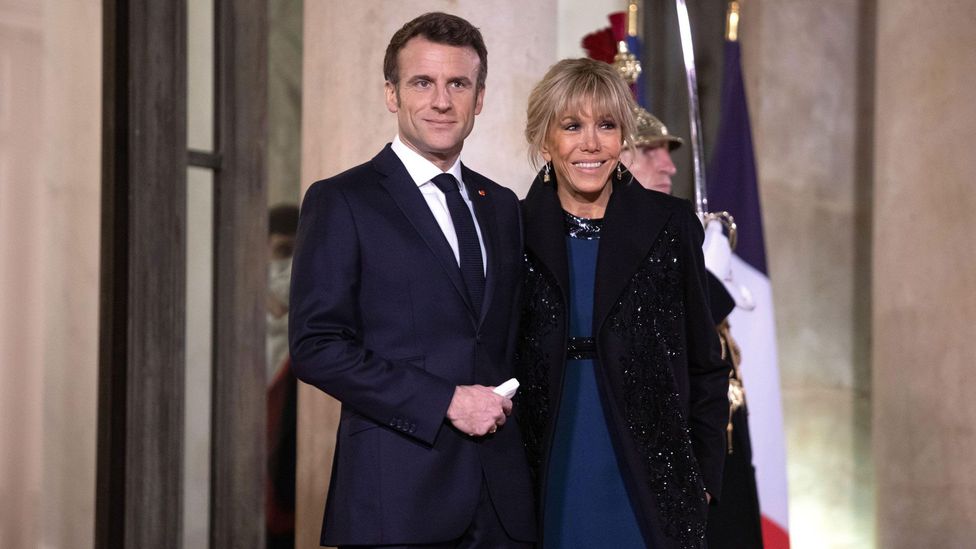The relationship taboo that won’t die

Article continues below:
A viral chart from 2019 keeps popping up on social media: a graph detailing Leonardo DiCaprio’s dating history. A Reddit user had spotted a trend – although the actor was 44 at the time, he seemingly only dated women aged 25 or younger, always breaking up with partners before they reached their 26th birthday.
Responses to the chart were mixed; some commended DiCaprio for his ability to attract younger women, while others berated the veteran actor, begging him to find someone closer to his own age. Even at three years old, the chart continues to resurface, as commentators keep a keen eye on DiCaprio’s current relationship with 24-year-old Camila Morrone.
The reactions to the actor’s dating habits embody the contentious views surrounding age-gap relationships – for some, they are a source of admiration, while for others, there is something inherently unsettling about coupling up with a much younger person.
From Demi Moore and Ashton Kutcher, to George and Amal Clooney, high-profile age-gap relationships have always set tongues wagging. Although in 2014 the average age difference in US heterosexual relationships was a relatively small 2.3 years, many couples have a much wider gap. In Western countries, around 8% of male-female couples have an age-gap of 10 years or more, rising to 25% in male-male unions and 15% of female-female relationships. For some the gap is even larger – data suggests that around 1% of heterosexual couples in the US have an age difference of 28 years or more.
Our views around age-gap relationships are shaped by thousands of years of evolutionary psychology, and generations of social and cultural norms. Within the last hundred years, economic shifts and increased gender equalities have changed what is considered a ‘normal’ age-gap, and recent social justice movements have increased scrutiny of power dynamics in mixed-age relationships. Couples with large age gaps often face judgement, and while some experts believe that this could be about to change, others argue that young people could be becoming more disapproving of mixed-age love than ever before.
An evolutionary nudge
Those who find DiCaprio’s dating habits distasteful aren’t without good reason. Aversions to age-gap relationships are very common and, like most taboos, they stem from thousands of years of evolution as well as more recent social and cultural cues.
“In many cultures, it is not considered acceptable to fall in love with someone who is much older or younger than you,” says Dr Elena Touroni, a consultant psychologist and co-founder of The Chelsea Psychology Clinic in London. “From an evolutionary perspective, the drive to have a family can have an impact on who we choose to have a relationship with – both from a biological perspective but also in the sense of both parents being alive to raise the child.”
Story continues below
In many cultures, it is not considered acceptable to fall in love with someone who is much older or younger than you – Dr Elena Touroni
For both men and women, fertility tends to decline after the age of about 35, and though women lose their ability to conceive much more rapidly, it makes sense that we’ve evolved to be attracted to people who are similarly aged. Although there is relatively little data on age in LGBTQ+ relationships, we know that age-gaps among same-sex couples are much more common, perhaps reflecting how much the ability to biologically conceive together influences how we approach finding a partner.
It’s not just about parenting, however. Pairing up with someone of a similar age makes your relationship more likely to go the distance, research shows. Experts believe that this is because these couples tend to go through life challenges and stages at a similar time, and can therefore continue to find common ground.
“In the initial 10 years of marriage, people report higher levels of marital satisfaction when their partner is younger than them,” says Grace Lordan, an associate professor of behavioural science at the London School of Economics, who is currently researching age-gap relationships and happiness. “However, over time, the marital satisfaction of different-aged couples declines more than similar-aged partners. The probability of similar-aged couples divorcing is also lower.”
Yet despite these factors nudging us towards partners of the same age, socio-economic circumstances can sometimes counteract evolutionary urges. In 1900, the average age-gap between couples was about double the gap in 2000; historically people (particularly those in the middle- and upper-classes) would have been much more likely to marry someone far older or younger than them.
The reasons for this are both biological and economic. If a 50-year-old man wants to have children, it is not in his interest to couple up with a similarly-aged woman who is much less likely to still be fertile. In a patriarchal society in which men have the economic power, the choice to pair up with a much younger woman would be more likely to be available to him.
In the 19th and early 20th Centuries, most women were excluded from the workforce, so it made sense for them to prioritise marrying someone who had already achieved financial security. For men, it made sense to establish themselves economically and worry about marriage at a later date – when due to their increased social power they were able to find younger wives who provided the best chance of having children.
Whom we judge and why
As women have gained greater economic power, however, the appeal of a much-older spouse has fallen, making age-gap relationships less common – and often more taboo.
These days, even as most societies embrace increasingly progressive views on love, relationships and the rich variety of ways they can present, couples where one person is much older than the other still face judgement. Rather than assume people are happily together, there’s a tendency to worry about possible power imbalances, and view the relationship as transactional, assuming one party is seeking to elevate their social status or wealth. There’s even specific vocabulary to aid that judgement; an older man must be a ‘sugar daddy’, a younger woman a ‘gold-digger’ or victim of ‘daddy issues’.

The relationship between Emmanuel and Brigitte Macron, married since 2007, has been scrutinised in the media (Credit: Alamy)
In recent years, that vocabulary has been expanded to include relationships in which women are the significantly older partner; words like ‘cougars’ and ‘toyboys’ reflect the rise in this kind of relationship. Statistics show that in 1963 just 15% of UK brides were older than their grooms. By 1998, this had risen to 26%, and findings from one 2011 study suggested that the number of women married or cohabiting with a man five years or younger had almost tripled since the 1970s.
Women who choose to date younger men seem to face a disproportionate amount of judgement. “Us humans are judgemental, and if what our neighbour is doing is misaligned with what we expect, we put a spotlight on it,” says Lordan. “Women who match with younger men go most against the grain when it comes to our narrative of marriage, and so suffer the most judgement.”
The media attention that surrounded French President Emmanuel Macron’s marriage to a woman 24 years his senior, or the fevered coverage of 41-year-old Kim Kardashian’s relationship with 28-year-old Pete Davidson only underlines this. Yet Touroni believes that older men/younger women relationships are now perceived with even more judgement than older women/younger men couples.
This is perhaps in part linked to the #MeToo movement, which placed increased attention on power dynamics in relationships. Some argue a significant age-gap, combined with the social and economic power that men wield in a male-dominated society, can leave young women in a vulnerable position. One study conducted shortly after #MeToo took hold shows that many outsiders believe that there’s an aspect of exploitation in age-gap relationships. Researchers found young people were particularly averse to relationships in which the male partner was older, and posited this was because they assumed that the relationship was exchange-based – for example, that people were exchanging sex for a certain lifestyle.
Will the age-gap taboo disappear?
Today, there is an increased acceptance that all relationships look different – whether this relates to sexuality, gender or even the number of people in the same relationship.
Us humans are judgemental, and if what our neighbour is doing is misaligned with what we expect, we put a spotlight on it – Grace Lordan
Touroni says as more kinds of relationships are normalised, she hopes that people will respect the choices of those in age-gap relationships. “We are living in an era of more freedom and flexibility, so I would like to think that over time we will become significantly less judgemental about other people’s relationship choices, whether that’s age-gaps or anything else.”
Yet there’s little evidence that society’s fascination with age-gaps is lessening. So-called May-to-December celebrity love affairs still regularly make headlines, and young people seem even more judgemental of age-gap relationships than their older counterparts, particularly when a man is older than a female partner. Given that young people are generally at the forefront of social changes, their disapproval could mean that the age-gap taboo might become even more deeply entrenched.
“Overall, I do hold out hope that we are becoming less judgemental of others, whatever their choices are,” says Lordan. “But the narratives of what a ‘good’ relationship looks like are so hard-wired in Western society, it is unlikely that we will reach a place where people stop judging the lifestyle choices of others that go against these norms, including age-gap couples.”

Article continues below
In one memorable episode of Sex and the City, Carrie admits to being completely taken with her new beau, Jack Berger. “Everything is fresh, everything is a first, everything is foreplay,” she says, describing their time together. “Even a trip to Bed Bath & Beyond can be an ecstatic errand… And of course, those first kisses are the greatest in the world.”
The first two times they are intimate, however, Carrie finds the experience distinctly disappointing. “Dump him,” Samantha advises Carrie – following up with an unprintable take on the phrase “fool me once, shame on you; fool me twice, shame on me”.
The episode – whose title was “Great Sexpectations” – caught the attention of psychologist Jessica Maxwell, a senior lecturer in psychology at the University of Auckland, New Zealand. “I was caught off guard that the characters would just assume sex should be relatively effortless and be so willing to throw in the towel on a relationship if the sex is bad,” she says. Yet her conversations with her friends suggested that many people in real life take Samantha’s attitude.
Those thoughts led Maxwell to investigate the ways our beliefs can influence our intimate relationships in the short and long term. On the one hand, there is the “sexual growth mindset” – the belief that satisfaction requires effort and work. On the other, there’s the “sexual destiny mindset” – the idea that natural compatibility between sexual partners is the key factor that allows couples to maintain sexual satisfaction, which means that any struggles in a sexual relationship can signal the relationship is destined to fail.
In a series of studies, Maxwell has found these mindsets can dictate the ways people deal with problems in the bedroom, with huge consequences for the quality of their relationships. Her research suggests that by forging more constructive ‘sexpectations’, we might all enjoy a healthier and happier love life.
Romantic destiny?
Maxwell’s findings join a growing body of literature examining the effects of mindsets across many different areas of life.
The most famous studies come from Carol Dweck at Stanford University. In decades of research, she has examined whether people believe academic ability is fixed and cannot be changed, or whether they see their abilities as something that can grow with practice. In general, people with the growth mindsets seem keener to take on new challenges and are better able to handle setbacks. And attempts to promote the growth mindset, applied in a supportive educational environment, seem to increase students’ overall achievement, so that struggling children can better meet their potential.
Story continues below

A ‘destiny’ mindset means you’re more likely to see conflict as a sign that the relationship is not meant to be (Credit: Getty)
Inspired by Dweck’s findings, psychologists across the world have now explored the role of mindsets in many other outcomes, including people’s health and fitness behaviour, passion in the workplace and the strength of their romantic relationships.
If you have a “romantic destiny mindset”, you are more likely to agree with statements such as: “Potential relationship partners are either compatible or they are not” and “Relationships that do not start off well inevitably fail”. You will probably believe in love at first sight. If you have a “romantic growth mindset”, meanwhile, you might see love as something that blossoms as you get to know each other. You’re more likely to agree with statements such as “The ideal relationship develops gradually over time” and “Challenges and obstacles in a relationship can make love even stronger”.
The two sets of beliefs are not necessarily mutually exclusive, meaning you could score high (or low) on both measures. (You might expect compatibility to be somewhat important and hope to have instant chemistry with your future partner, while also recognising the need to work hard at building a deeper connection.) And the research shows that these beliefs can both profoundly influence couples’ interactions.
For example, people who score higher on the destiny mindset scale may fare well in the first flush of romance, but they are more likely to lose interest in the relationship when times get tough. “The belief is that, if my partner and I are having conflict, it means we’re not compatible,” says Dylan Selterman, an associate professor at Johns Hopkins University, Baltimore, US. “There’s a shift away from repair and commitment.”
In one recent paper, Selterman surveyed around 500 people about the times they had cheated in a relationship. He found that the people with the destiny mindsets were more likely to blame it on factors such as neglect from their partner. When they felt things were falling apart, they simply felt less committed to staying faithful.
The conflict can be seen as an opportunity for us to learn more about each other and to grow together in a positive direction – Dylan Selterman
The people who score high on the growth mindset scale, meanwhile, tend to deal better with conflict, since they believe they can work through it. “The conflict can be seen as an opportunity for us to learn more about each other and to grow together in a positive direction,” says Selterman. In his study on cheating, these people were significantly less likely to blame their infidelity on problems such as low commitment to their existing relationship.
Sex takes work
As interesting as these studies were, the focus had been on the romantic rather than the physical side of the relationship. Maxwell suspected that our attitudes to sex might be equally important, with unique consequences for our relationships.
To find out, she designed a parallel set of scales that measured the “sexual destiny mindset” and the “sexual growth mindset”.
Like its romantic equivalent, the sexual destiny mindset focused on the belief that sexual compatibility is instant and reflects the overall suitability of their partner, through agreement with statements such as “If sexual partners are meant to be together, sex will be easy and wonderful” and “It is clear right from the start how satisfying a couple’s sex life will be over the course of their relationship”.
The sexual growth mindset, in contrast, is measured through agreement with statements such as “Making compromises for a partner is part of a good sexual relationship” and “A satisfying sexual relationship is partly a matter of learning to resolve sexual differences with a partner”.
In a series of studies, Maxwell and her colleagues have confirmed that people’s sexual mindsets influenced their sexual satisfaction and their overall relationship quality above and beyond their romantic mindsets. The sexual destiny mindsets were especially important when couples faced disagreements about their sex life. “They’re letting what happens in the bedroom bleed over to affect their overall judgments about the relationship,” says Maxwell. A greater endorsement of sexual growth beliefs, in contrast, tended to produce happier relationships, in and out of the bedroom.

A ‘growth’ mindset in the bedroom predicts greater sexual satisfaction (Credit: Getty)
Maxwell next wanted to know how variations in mindsets affected people’s day-to-day sex lives. (In general, people’s scores on mindset scales are thought to be relatively stable over time but they can move around an average “set point”.) She asked participants to complete a diary over three weeks, which allowed her to track changes to people’s mindsets and the overall quality of their sexual experiences. “We found that greater endorsement of the belief that ‘sex takes work’, on any given day, brings benefits,” she says.
As further evidence, Maxwell explored the ways that the sexual mindsets influenced couples’ transitions to parenthood – an event that is known to play havoc with sexual relationships. In line with the previous findings, the growth beliefs predicted greater satisfaction for both the individual and their partner during this difficult time. High destiny beliefs, in contrast, resulted in considerably less satisfaction.
Maxwell and her colleagues have now replicated these findings in other contexts – and she has been pleased to see that many other researchers are now investigating the importance of mindsets in our sexual relationships. They have shown, for example, that mindsets influence how well people cope with low sexual desire and the communication between partners about their sexual needs.
Sexual healing
In the future, might this research provide new interventions for couples who are struggling to connect?
So far, there is some evidence that the mindsets are malleable, at least temporarily. In one recent study from the University of Minnesota Duluth, US, researchers asked some participants to read a (fake) news article, which emphasised the idea that couples’ love can blossom with hard work – text that was designed to prime a romantic growth mindset. They were then questioned about their attitudes to various kinds of perceived infidelity – from flirting with someone to cybersex and direct sexual contact. The people primed with the growth mindset tended to take more forgiving attitudes.
They’re letting what happens in the bedroom bleed over to affect their overall judgments about the relationship – Jessica Maxwell
Maxwell has performed a similar experiment using articles that attempted to manipulate people’s sex mindsets. Once participants had read the articles, she gave them bogus feedback on how compatible they were as a couple, based on a survey they’d taken 10 days beforehand. Hearing they had low sexual compatibility with their partner led many participants to reassess their relationship quality – but the effect was much less pronounced among those who had been primed with the growth beliefs, suggesting that they would be less pessimistic and defeatist when they had real-life disagreements about their sexual needs.
The article promoting the sexual growth mindset also increased participants’ willingness to accommodate their partner’s sexual needs, Maxwell found. (Needless to say, she debriefed the couples afterwards and explained that the feedback on their compatibility was fake – so no one left the lab under any false beliefs about their relationships.)
Maxwell emphasises that these are preliminary findings of a short-term manipulation, but she is optimistic that education about the growth mindset could help to inform couples’ therapy. “I think it would have to involve multiple exposures to the idea,” she says, and she thinks that the couples would need encouragement to apply what they had learnt.
Maxwell also points to a study that asked couples to watch movies depicting relationship problems, before reflecting on the content and describing how the same lessons might apply to their own lives – a surprisingly simple intervention that significantly reduced divorce rates over a three-year period. “It was essentially as effective as regular couples therapy,” she says. She’d be interested to see whether you could apply the same method, but with an extra focus on the mindsets the characters are revealing and the effects that has on the relationships.
You could ask couples to spot when the characters fail to communicate their needs because of their destiny mindset, for example, and to suggest ways that the fictional couples could use a growth mindset to navigate the problems more constructively.
If so, it may be time to start re-watching those Sex and the City episodes.
David Robson is a science writer and author of The Expectation Effect: How Your Mindset Can Transform Your Life, published by Canongate (UK) and Henry Holt (USA) in early 2022. He is @d_a_robson on Twitter.

Article continues below
Three months before high-school sweethearts Tai and Talaat McNeely were about to tie the knot, Tai had learned that Talaat had been keeping a secret from her: he had sizable loans and credit-card debt. It almost ended their relationship.
“He didn’t want to tell me the truth about his finances,” says Tai. Even though the Chicago-based couple had gone through counseling which touched on money matters in the lead-up to their wedding, Talaat had still kept his complicated financial situation hidden from Tai. To her, it was a breach of trust that almost derailed their engagement.
Talaat had committed what’s known as ‘financial infidelity’: when a person in a couple hides or withholds money-related issues and decisions from their partner. According to a January 2022 survey by US News & World Report, as many as one in three couples deal with financial infidelity in the US alone; other surveys suggest the practice is getting more common with each passing year. The effects can be devastating: a 2018 study showed 76% of married couples involved in financial infidelity say the experience negatively impacted their relationship, and 10% got divorced over it.
Experts say the reason financial infidelity is so common is because we find money matters in general hard to talk about – and things become even harder when we think we’ve mismanaged our money or used it in a way that our partner might disapprove of. But they also say that conquering that taboo around discussing money is key for couples to survive the fallout – or avoid it altogether.
The ’hidden’ nature of financial infidelity
Financial infidelity covers a wide range of behaviours. It could be something as seemingly banal as not filling in your partner on tiny purchases here and there, like the after-work happy hours with colleagues. But it could also be something more serious: siphoning money from shared accounts, lying about your income or debts, lending large amounts without consent, making extravagant purchases without permission or keeping bank accounts or credit cards secret.
Story continues below
Boxes from online shopping piling up could be a sign of your spouse making purchases behind your back, a sign of financial infidelity (Credit: Getty Images)
Michelle Jeanfreau, associate professor of child and family sciences at the University of Southern Mississippi, US, says there still isn’t a lot of public awareness about financial infidelity. According to her and her colleagues’ research, while 27% of people surveyed explicitly admitted to committing financial infidelity, more than half of them reported committing behaviours that could be classified as financial infidelity – suggesting many people don’t know what exactly constitutes financial infidelity.
Jenny Olson, an associate professor of marketing at Indiana University, US, who’s studied the phenomenon, says two main components must exist to classify as financial infidelity. One: you have to be engaging in a financial behaviour you know your partner would disapprove of; two: you keep that behaviour a secret. “There’s anticipated disapproval,” she says.
While there is limited data, experts suspect that financial infidelity has been on the rise for decades, since more households now have two breadwinners. “Now, people have separate bank accounts, multiple income streams, a lot of people have more than one job, a lot more people are talking about their side hustles,” says Jeanfreau. “I think it’s just easier to blur the lines.”
It’s also easier to keep it secret nowadays because “it’s hidden, and it’s so difficult to observe”, says Olson. “We’re not managing a cheque book at the kitchen table. We’re logging on [to banking apps] to see some seemingly virtual expenditures that don’t feel real, depleting a pool of shared resources.” So, it’s easier to commit (and harder to notice) financial infidelity when your funds feel intangible and invisible.
Autonomy and avoidance
There are many reasons people might hide some or all of their spending from their partner.
Olson suggests some people commit financial infidelity as a way of reclaiming autonomy in the relationship; they use spending as a means of reasserting their power. “We have this wanting to not just be together, but separate,” says Olson. “We’re our own individual persons, and we like to have some autonomy with our finances as well.”
Problems with managing money can make you feel less than, and worried about what people will think of you – Beverly Harzog
But the most common reason people keep finances secret is because they want to avoid a confrontation or being made to feel embarrassed about their spending. Rather than being an act of malice, financial infidelity often occurs because the perpetrator cares so much about what their partner is going to think of them that they hide their transgressions.
Ottawa-based Melissa Houston, an accountant, says she knew her spiral of overspending was wrong, but didn’t want to reveal her behaviour to her husband because he trusted her to run their finances. “There’s just so much shame around mismanaging money,” she says. “I was embarrassed. I was ashamed.”
Houston began overspending as “an avoidance behaviour” triggered by dissatisfaction with her job as an accountant. Things came to a head when she told her husband she’d committed to the purchase of an in-ground swimming pool in the backyard. When she came clean, she says, “the look of disappointment on his face was brutal”.
Beverly Harzog, credit card expert and columnist at US News & World Report, and the editor of its January 2022 financial infidelity survey, says money matters can be highly emotional. “As adults, problems with managing money can make you feel less than, and worried about what people will think of you,” she says.
But our ability to discuss money can also depend on our upbringing, adds Harzog: “Was it taboo to talk about money, was it openly discussed or was it never really addressed?” Recent UK research showed less than half of the 3,000 parents surveyed talked openly with their children about money – even though encouraging financial literacy feeds into healthier spending in adult life.
Tai McNeely says even before she found about Talaat’s debts, she was the more financially savvy of the two; she’d already paid off a car as a teenager and put herself through university. “I had the great credit score, he didn’t. I knew how to handle all the money, he didn’t.”
Bouncing back
Dealing with financial infidelity as a couple can be hard – and the first challenge may be finding out about it. According to the US News & Report survey, only 8% of partners find out about it via a confession. Often, partners will only find out what’s going on by noticing little things – the arrival of more boxes than usual, or the fact that their partner’s holiday bonus never materialised.
Broaching the subject can also feel very hard. “I like the word ‘taboo’ to discuss money,” says Jeanfreau. “Like, you’re supposed to know what to do with it, but no one wants to talk about it.” Olson adds that “we’ve been trained not to” bring the subject of money up, despite “finances being a huge part of our lives” and “a bedrock of a relationship”.

Experts urge couples have regular, open conversations about money in a non-judgmental setting to avoid one partner making unpleasant financial discoveries (Credit: Getty Images)
To avoid problems, say both experts, it’s important to establish a regular time to discuss spending, including setting budgets for each person. And for people who do find their partners committing financial infidelity, the experts recommend avoiding hostility or judgment, even though it can be upsetting.
“We do all make mistakes,” says Harzog. “Hopefully, this person is important to you. At least put in the effort to see if you can come back from that.” She says financial breaches of trust aren’t usually as serious in a relationship as someone having an affair, for instance. As long as one person doesn’t feel trust has been irrevocably destroyed, couples can bounce back.
In the wake of her financial infidelity, Houston changed jobs; she started her own business to empower women to take control of their money. While she and her husband are still rebuilding trust, she says that their communication around money and spending has become much more honest, open and frequent. She believes that getting coaching or therapy to tackle the issues causing the financial behaviour, like a lack of satisfaction in other parts of life, is crucial. “It is so important, even when you get your money mindset back on track, to keep checking in on yourself,” she says.
McNeely and her husband, meanwhile, have now been married for 16 years. Together they run a podcast and YouTube channel that gives financial advice to couples. McNeely says that once her husband acknowledged what he had done, they were able to work together as a team to move on. Even though his actions temporarily screeched their relationship to a halt, she realised that the complicated, awkward nature of discussing money – even with your life partner – could be more to blame than the partner himself.
“It wasn’t that he didn’t love me,” she says. “He just didn’t want to disappoint me.”





